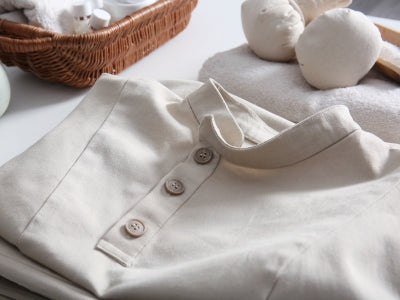Investing in durable and long-lasting promotional workwear is crucial for employers and employees. Whether for industrial environments, construction sites, or any other workplace that demands resilience, the choice of materials plays a pivotal role.
This blog post will explore the different materials used in workwear and their advantages. By understanding which materials ensure durability, you can make informed decisions that help protect your employees and enhance your brand's image.
The Importance of Durable Workwear
Workwear is more than just a uniform. It's a protective barrier that shields your employees from hazards, ensuring their safety and well-being. Not only does durable workwear reduce the risk of injuries, but it also saves you money in the long run by minimizing the need for frequent replacements. Let's dive into the materials that guarantee durability and longevity in workwear.
Materials for Durable and Long-Lasting Workwear
Cotton: Comfort and Affordability
Cotton is a popular choice for workwear because of its comfort and affordability. It’s breathable, soft against the skin, and allows heat to escape. This material can help employees cool. However, pure cotton may not be as durable as some other materials. For enhanced durability, look for workwear made from a cotton blend or with added treatments.
In addition to being more durable than pure cotton, these fabrics can last longer than 100% cotton. For example, a denim blend is often made up of 80% cotton and 20% polyester or other synthetic fibers that enhance its strength and endurance.
Polyester: Strength and Resilience
Polyester workwear is known for its exceptional durability. Polyester fibers are resistant to wear and tear, making them ideal for industries that involve demanding physical tasks. Additionally, polyester has moisture-wicking properties, which helps keep employees dry and comfortable throughout the workday.
Performance Fabrics: Moisture Control and Heat Management
Performance workwear is designed to keep workers cool in the summer and warm in the winter. These fabrics are often made from synthetic materials, like polyester or nylon, which allow sweat to quickly evaporate away from the body instead of being absorbed by cotton.
Denim: Ruggedness and Timelessness
Denim workwear is synonymous with durability. Its sturdy construction and ruggedness make it suitable for heavy-duty industries such as automotive and construction. Denim resists abrasions and provides excellent protection for employees working in demanding environments.
Treated Cotton: Protection against Elements
For workplaces where employees are exposed to wet or dirty conditions, treated cotton is a great option. Treated cotton workwear is coated or finished with special treatments that enhance its resistance to water, oil, and stains. This ensures that employees stay dry, clean, and comfortable even in unfavorable conditions.
Blended Fabrics: Combining Strengths
Blended fabrics combine the strengths of different materials to create workwear with enhanced durability. Some popular blends include cotton polyester and cotton nylon. Cotton-polyester blends offer the comfort of cotton and the wrinkle resistance of polyester. Cotton-nylon blends provide increased abrasion resistance while maintaining comfort.
FAQs
Q1. What are the most commonly used materials for workwear?
A1.
- Cotton: Cotton is a popular choice due to its comfort, breathability, and affordability. However, it may not be as durable as other materials.
- Polyester: Polyester is known for its excellent durability and resistance to wear and tear. It also provides moisture-wicking properties, making it suitable for physically demanding tasks.
- Denim: Denim workwear is known for its ruggedness and longevity. It offers great resistance against abrasions and is commonly preferred in industries such as automotive and construction.
Q2. Are there specific materials suitable for extreme weather conditions?
A2. Yes, certain materials are designed to withstand extreme weather conditions. For instance:
- Treated cotton: Cotton can be treated with special coatings or finishes to enhance its resistance to water, oil, and stains. This makes it suitable for wet or dirty environments.
- Nylon: Nylon workwear offers exceptional water and wind resistance, making it ideal for outdoor jobs that involve exposure to rain or high winds.
- Flame-resistant fabrics: For workplaces with potential fire hazards, flame-resistant materials such as Nomex and Kevlar provide exceptional protection and are often mandated.
Q3. How does workwear's fabric weight affect its durability?
A3. The fabric weight is an essential factor to consider when it comes to workwear durability. Typically, heavier fabrics tend to be more resistant to wear and tear.
But it's essential to strike a balance between weight and comfort. Opting for medium-weight fabrics that offer decent durability without compromising on comfort is often a wise choice.
Q4. Can blended fabrics offer durability advantages?
Q4. Certainly! By blending different fibres, workwear manufacturers can combine the strengths of multiple materials. For example:
- Cotton-polyester blend: This blend combines the breathability and comfort of cotton with the durability and wrinkle resistance of polyester.
- Cotton-nylon blend: Blending cotton with nylon creates workwear that offers comfort and increased abrasion resistance.
Q5. How should workwear be cared for to ensure its longevity?
A5. Proper care plays a significant role in extending the lifespan of workwear. Here are some essential tips for maintaining durability:
- Wash according to the manufacturer's instructions: Following proper washing guidelines helps prevent unnecessary wear and tear.
- Avoid using harsh detergents or bleach: These can damage the fabric and compromise its durability.
- Patch or repair minor damages promptly: Small tears or holes should be addressed immediately to prevent them from getting worse.
At Cubic Uniforms, we understand the importance of dependable and long-lasting workwear. We specialise in providing high-quality promotional uniforms that not only protect your employees but also enhance the image of your brand.
Our selection of durable workwear offers various materials to fit the demands of your workplace, whether it's for industrial environments, construction sites, or outdoor jobs. Don't settle for less when it comes to your employees' safety and comfort.
Conclusion
Choosing materials that ensure durable and long-lasting workwear is essential for both employee safety and the reputation of your brand. Cotton, polyester, and denim are popular choices that offer different strengths.
Treated cotton provides protection against the elements, and blended fabrics combine the best features of multiple materials. By investing in durable workwear, you not only protect your employees but also project a professional brand image. Make informed decisions based on the demands of your workplace, and ensure your employees have workwear that is built to last.
Contact Cubic Uniforms today to explore our range of customisable workwear options and take the first step to outfitting your team in reliable and stylish uniforms!




